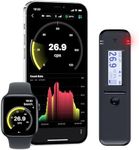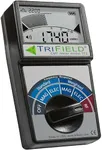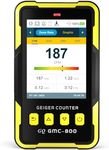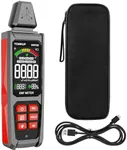Buying Guide for the Best Radiation Meters
Choosing the right radiation meter is crucial for ensuring safety and accuracy in environments where radiation levels need to be monitored. Whether you are a professional working in a field that requires radiation monitoring or a hobbyist interested in measuring radiation levels, understanding the key specifications of radiation meters will help you make an informed decision. Here are the key specs you should consider when selecting a radiation meter and how to navigate them to find the best fit for your needs.Type of Radiation DetectedRadiation meters can detect different types of radiation, such as alpha, beta, gamma, and X-rays. This spec is important because different applications require the detection of specific types of radiation. For example, alpha radiation is typically found in industrial settings, while gamma radiation is more common in medical and environmental monitoring. To choose the right meter, identify the type of radiation you need to measure and ensure the device is capable of detecting it. Some meters can detect multiple types of radiation, which can be useful for versatile applications.
SensitivitySensitivity refers to the meter's ability to detect low levels of radiation. This is important for ensuring accurate readings, especially in environments where radiation levels are expected to be low. Sensitivity is usually measured in counts per minute (CPM) or microsieverts per hour (µSv/h). High sensitivity meters are suitable for detecting very low levels of radiation, which is essential for environmental monitoring or personal safety. If you need to measure higher levels of radiation, a meter with lower sensitivity may suffice.
Measurement RangeThe measurement range indicates the minimum and maximum levels of radiation the meter can accurately measure. This spec is crucial for ensuring the meter can handle the expected radiation levels in your environment. For example, a meter with a range of 0.01 to 1000 µSv/h is suitable for both low and high radiation environments. To choose the right range, consider the typical radiation levels you expect to encounter. If you work in a high-radiation area, ensure the meter can measure those levels without saturating.
AccuracyAccuracy refers to how close the meter's readings are to the actual radiation levels. This is important for reliable monitoring and safety assessments. Accuracy is usually expressed as a percentage, such as ±10%. Higher accuracy meters provide more reliable data, which is crucial for critical applications like medical or industrial use. If precise measurements are not as critical for your application, a meter with lower accuracy may be acceptable.
Response TimeResponse time is the duration it takes for the meter to provide a reading after detecting radiation. This is important for real-time monitoring and quick decision-making. Response times can vary from a few seconds to several minutes. Faster response times are beneficial in situations where immediate readings are necessary, such as emergency response or quick surveys. For less time-sensitive applications, a longer response time may be acceptable.
Display and InterfaceThe display and interface of a radiation meter determine how easy it is to read and interpret the data. This is important for user convenience and accuracy in reading measurements. Displays can range from simple digital readouts to more complex graphical interfaces. Choose a meter with a display that is easy to read and understand, especially in the conditions where you will be using it. An intuitive interface with clear buttons and menus can also enhance usability.
PortabilityPortability refers to the ease with which the meter can be carried and used in different locations. This is important for fieldwork and situations where the meter needs to be moved frequently. Portable meters are typically lightweight and compact, making them easy to carry. If you need to use the meter in various locations or for extended periods, choose a portable model that is comfortable to handle and transport.
Battery LifeBattery life indicates how long the meter can operate on a single charge or set of batteries. This is important for ensuring continuous operation without frequent recharging or battery replacement. Longer battery life is beneficial for extended fieldwork or situations where access to power is limited. Consider how long you need the meter to operate and choose a model with sufficient battery life to meet your needs.



















